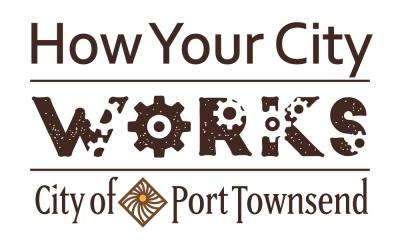How Your City Works
How Your City Works is a multi-part program series focused on telling the story of how The City of Port Townsend infrastructure works in a fun and educational format. Upcoming programs include the city's sewer network and how waste travels from your home to the processing plant and what happens there. How our streets are made and repaired, how compost is created from yard waste, our amazing trail system, the city’s historic buildings, the water treatment plant and how that functions. We are focusing on programs that will be of interest to a large audience that can be presented in a teachable format.
Upcoming Talks in 2024
How Streets are Built
Thursday, June 27, 6:00 p.m.
View Program Slides Here
Join Public Works Director, Steve King and Project Manager, Tyler Johnson for an educational talk at the library on how streets are built. The talk with look into the history of Port Townsend's roads, how they are planned, built and maintained. The talk is a continuation of the How Your City Works series. Watch the How Streets Are Built video here.
2023 Talks
Unusual Items You Can Check Out
Tuesday, November 14th, 7:00 p.m.
The talk will be held in the Carnegie Reading Room at the Port Townsend Public Library.
Did you know that you can check out camping gear from library? How about sewing machines and crafting equipment? Join Library Manager, Keith Darrock as he explores the growing assortment of unusual and interesting items that you can checkout from the library. The talk will cover the full-range of items in the library's unusual items collection, it's history and the philosophy for broadening the library's collection outside of books.
Celebrating 110 Years in the Carnegie Library
Tuesday, October 17th, 7:00 p.m.
Watch Recording Here
Join Library Director Melody Sky Weaver as she gives a talk on the 110 year history of the Carnegie Library. She will be heavily referencing the wonderful book Port Townsend Public Library 100 Years in the Carnegie Library by Christopher Clow.
What Happens After You Flush? The Story of the City's Wastewater
Tuesday, May 3, 7:00 p.m.
Watch Recording Here
Presented by Bliss Morris, City of Port Townsend Wastewater Operations Manager. Did you know the City’s wastewater division is responsible for the treatment of 286-million (800k daily) gallons of wastewater from our homes and businesses! This all travels through a vast series of underground pipes, to our wastewater treatment facility where the wastewater is treated by removing contaminants, solids, and harmful bacteria that meets all regulations from the Department of Ecology before being released into the Straits of Juan De Fuca. Routine activities include: bio-solids dewatering, laboratory sample collection, testing and analysis, process control, and regulatory reporting.The City maintains more than 77 miles of sanitary sewer lines, has 120 manholes, 6 lift stations, and 3 emergency generators.
Giving Back to the Land: The Story of City Compost
Tuesday, June 7th, 7:00 p.m
Watch Recording Here
Have you ever wondered how your yard waste becomes compost? Presented by Bliss Morris, City of Port Townsend Wastewater Operations Manager The City has a small and dedicated team who transforms mountains of yard waste into usable compost. Learn the process of compost creation on an industrial scale and how you can apply these techniques on a smaller scale at home too! The City’s compost facility was one of the first in the state to compost bio-solids, and has been up and running at the same location since 1994.
Water Treatment Plant: The Story of Water
Tuesday, October 25th, 7:00 p.m.
Watch Recording Here
Part three in the How Your City Works series. Michael Spears, Water Quality - Lead Operator with the City of Port Townsend will talk about the City's water system. Join us to learn about the City’s water system history and present day applications. Michael’s expertise is in water quality where they focus on providing water treatment and safe drinking water for our community.
Port Townsend Water Resources has two divisions that is staffed by nine State certified operators. Water Distribution is responsible for reading meters, installing new meters, repairing leaks, fire hydrant maintenance, system flushing, routine water sampling, and handling water supply related issues. Water Quality is responsible for water treatment and safe drinking water compliance. This includes maintenance and operation of the City’s Water Treatment Facility, water sampling, responding to water quality concerns, watershed control, reporting, public education and community outreach. Learn more here.

